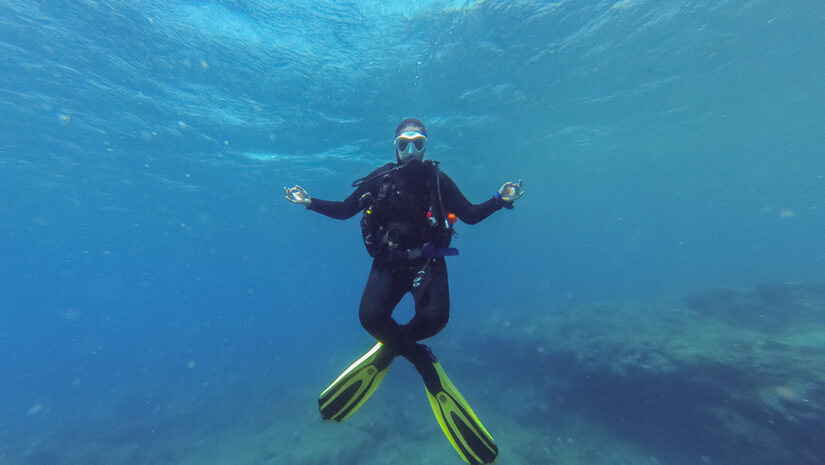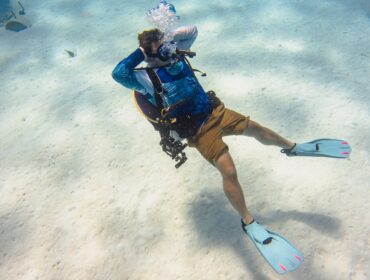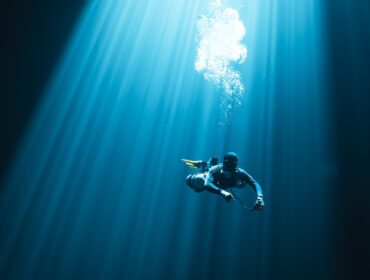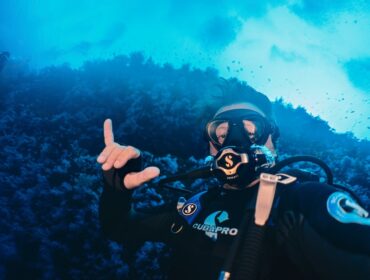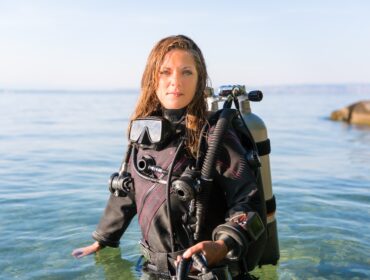Scuba Diving is the new Yoga. The two may seem like a complete contradiction. Diving is viewed as a high-risk adrenaline sport involving close encounters with sharks. At the same time, yoga is considered a serene, mystical experience practiced by impossibly flexible devotees. But, there’s a lot in common than you think. Many in the sport have begun to refer to “scuba as the new yoga” and predict that scuba diving vacations will be the hot new trend for people seeking stress relief and relaxation.
So, how can scuba diving, with all its heavy tanks and bulky scuba gear, have any similarity to yoga, you may ask? Like yoga, diving is all about breathing, staying calm, and experiencing your surroundings by becoming one with it. Many divers already use yoga as a tool for improving their scuba skills. Learning proper breathing techniques, as taught in yoga, can help a diver conserve air underwater and make the best of the limited supply when underwater. The body’s weightlessness and the silence imposed by being submerged underwater all provide an ideal environment for being at peace with yourself and relaxing. Scuba diving helps slow you down and improve concentration and focus on your surroundings and self.
“For thousands of years, cultures around the world have sought places to go for quiet meditation and peace of mind — from the practice of Yoga in India to Henry David Thoreau’s walk through the woods of Walden Pond,” says Ben Teichberg, Scuba Diving Master Instructor with Scuba.com. “Today, scuba divers experience the same meditative benefits while enjoying nature and its underwater beauty.”
LeisurePro’s Teichberg offers reasons behind this exciting new trend of people exploring the sport of scuba diving as a way to find tranquility under the waves. The top six reasons sited by LeisurePro for this new trend of “Scuba as the new yoga” include:
- The body becomes relaxed underwater in a gravity-free environment where you become neutrally buoyant, like being in outer space.
- Many athletes use underwater meditation, such as Olympic swimmers
- Certain types of dives called “drift dives” allow you to gently move with the current, with minimal body movement
- As with meditation, slow breathing works best with scuba. Focusing on breathing relieves stress and promotes relaxation.
- The only noise you generally hear underwater is the sound of your breath.
- Observing the beautiful colors of fish, coral and other sea life is stimulating.
Scuba Diving is the New Yoga: LeisurePro Blog
Many times, divers don’t have to cover a lot of ground during a dive. Some dives, for example, called “muck dives,” are limited to a 10-foot radius, where you don’t move around much – but look slowly and carefully for microscopic creatures. This activity slows you down and requires complete concentration. You shed the inhabitations you face above water and take on a new persona when you dive, allowing you to experience nature and life in a new light. Diving vacations are the new way of escaping the stress of life above sea level.

